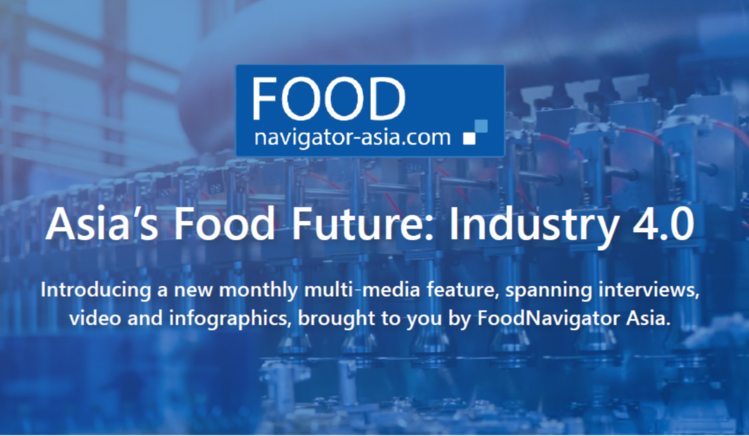Artificial intelligence is basically the use of algorithms to simulate aspects of human intelligence and usually also involves independent self-learning of required applications.
copyright by www.foodnavigator-asia.com
 According to Intello Labs Asia Pacific Head Tanmay Bhargava, AI-related algorithms need to self-learn from many data points before they become ‘practically usable’.
According to Intello Labs Asia Pacific Head Tanmay Bhargava, AI-related algorithms need to self-learn from many data points before they become ‘practically usable’.
Intello Labs specialises in using AI to develop image-based solutions in the form of smartphone apps for food product grading and quality monitoring.
“For example, Intello Labs’ AI uses several proprietary artificial neural network algorithms to extract useful features out of a food sample image [when looking at solutions for food safety and quality], while getting incrementally better with each data point,” he told FoodNavigator-Asia.
“[Current] alternatives to AI-based methods for food quality and safety are either manual or lab-based, [and while this] is crucial when it comes to food safety, it is not the best alternative anymore for use cases involving quality and grading.”
Alibaba Cloud, the technology arm of Alibaba Group, also sees AI as one of the ways forward in the food industry, and is capable of benefitting all segments within the food sector.
According to Alibaba Cloud Singapore General Manager Derek Wang: “AI is just like electricity: It can empower every aspect of agriculture and other processes [along the food chain].” “As an inherently data-reliant and data-rich tool, AI can bring massive benefits for all sectors.
“As an inherently data-reliant and data-rich tool, AI can bring massive benefits for all sectors.
Thank you for reading this post, don't forget to subscribe to our AI NAVIGATOR!
“AI could be used to automate food manufacturing and packaging processes, to inform crop planting and harvesting for more efficient production, and even to help crowdsource consumer feedback to develop new products.”
AI for speed and optimisation
When it comes to brands, Japanese beverage giant is using AI to forecast the production capacity for its soft drinks business. It started a trial operation in September last year and aims for full-scale AI operation for soft drink production in July this year.
The trial operation had shown that the use of AI could cut down the amount of inventory items and save about JPY$200m (US$1.78m).
“In soft drinks markets, supply and demand levels differ much depending on months (and seasons), so AI is helpful in forecasting production levels,” a spokesman said.
Similarly, machine learning is also required. The spokesman stressed that the AI system would need to ‘learn the way of decision making from experienced workers’ before it can start giving advice on the production levels.
To further improve the accuracy of the AI system, the employees will determine if the output produced by AI is optimum and will make further adjustments again to improve the system.[…]
read more – copyright by www.foodnavigator-asia.com


Artificial intelligence is basically the use of algorithms to simulate aspects of human intelligence and usually also involves independent self-learning of required applications.
copyright by www.foodnavigator-asia.com
Intello Labs specialises in using AI to develop image-based solutions in the form of smartphone apps for food product grading and quality monitoring.
“For example, Intello Labs’ AI uses several proprietary artificial neural network algorithms to extract useful features out of a food sample image [when looking at solutions for food safety and quality], while getting incrementally better with each data point,” he told FoodNavigator-Asia.
“[Current] alternatives to AI-based methods for food quality and safety are either manual or lab-based, [and while this] is crucial when it comes to food safety, it is not the best alternative anymore for use cases involving quality and grading.”
Alibaba Cloud, the technology arm of Alibaba Group, also sees AI as one of the ways forward in the food industry, and is capable of benefitting all segments within the food sector.
According to Alibaba Cloud Singapore General Manager Derek Wang: “AI is just like electricity: It can empower every aspect of agriculture and other processes [along the food chain].” “As an inherently data-reliant and data-rich tool, AI can bring massive benefits for all sectors.
“As an inherently data-reliant and data-rich tool, AI can bring massive benefits for all sectors.
Thank you for reading this post, don't forget to subscribe to our AI NAVIGATOR!
“AI could be used to automate food manufacturing and packaging processes, to inform crop planting and harvesting for more efficient production, and even to help crowdsource consumer feedback to develop new products.”
AI for speed and optimisation
When it comes to brands, Japanese beverage giant is using AI to forecast the production capacity for its soft drinks business. It started a trial operation in September last year and aims for full-scale AI operation for soft drink production in July this year.
The trial operation had shown that the use of AI could cut down the amount of inventory items and save about JPY$200m (US$1.78m).
“In soft drinks markets, supply and demand levels differ much depending on months (and seasons), so AI is helpful in forecasting production levels,” a spokesman said.
Similarly, machine learning is also required. The spokesman stressed that the AI system would need to ‘learn the way of decision making from experienced workers’ before it can start giving advice on the production levels.
To further improve the accuracy of the AI system, the employees will determine if the output produced by AI is optimum and will make further adjustments again to improve the system.[…]
read more – copyright by www.foodnavigator-asia.com
Share this: